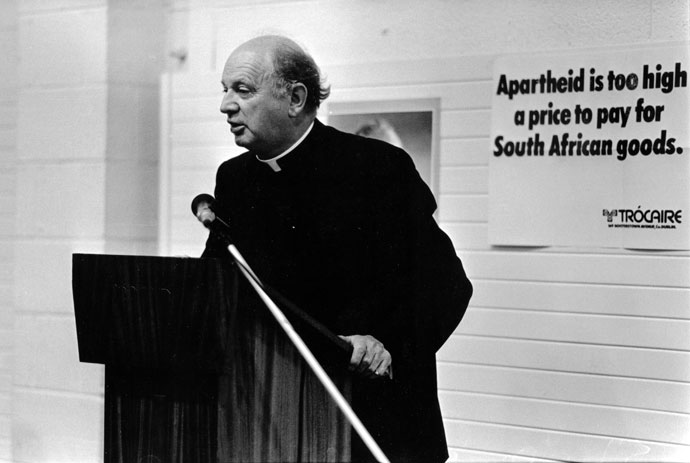Trócaire, the overseas development agency of the Catholic Church in Ireland has expressed regret at the death of Bishop Eamonn Casey RIP.
Bishop Casey was appointed Chairman of Trócaire following the organisation’s establishment in 1973. Working closely with the late Brian McKeown, Trócaire’s first Director, Bishop Casey shone a spotlight on situations of injustice overseas. He worked assiduously on behalf of marginalised communities, particularly in El Salvador, South Africa, Mozambique, Uganda, Malawi and the Philippines.
Trócaire Chairman Bishop William Crean said his work with the organisation in the 1970s and 1980s had benefited millions of people around the world, “Bishop Casey spoke out courageously in defence of persecuted communities overseas and was willing to place himself in danger in order to do so. His campaigning, both at home and overseas, raised awareness of grave injustices and helped to bring about positive change.”
Éamonn Meehan, Executive Director of Trócaire, said that Bishop Casey would be remembered with gratitude in communities across the developing world, “For two decades Bishop Casey was the driving force behind Trócaire. Bishop Casey and Brian McKeown, the first Director, formed a dynamic partnership. Together, they stood courageously with the world’s poor and championed their cause when others would not do so.”
Trócaire was heavily involved in the fight for human rights in El Salvador in the 1970s, and Bishop Casey played a leading role in highlighting the killing of civilians, human rights activists and church leaders in the country. Trócaire was supporting the El Salvador Human Rights Commission, which had been set up by Archbishop Oscar Romero, and other human rights organisations in response to the unlawful killing of 8,000 people.
When Archbishop Romero was murdered while saying Mass in 1980, Bishop Casey attended his funeral. The funeral was attacked by death squads and Bishop Casey narrowly avoided injury. He spent two hours ministering to the wounded. He was reported to have been the only Bishop to have remained at the Cathedral, with other visiting Bishops brought away for their own safety.
As an outspoken critic of apartheid, Bishop Casey called on the Irish Rugby Football Union to cancel a proposed tour of South Africa in 1981. He spearheaded Trócaire’s calls for the Government of Ireland to introduce trade sanctions against South Africa. South Africa was a priority country for Trócaire in the 1970s and 1980s at the height of the apartheid regime. The organisation began funding trade unions and other groups in South Africa in 1975. Bishop Casey was heavily involved in the organisation’s calls for the Government of Ireland to introduce trade sanctions against South Africa. In late March 1986 the Irish government announced a ban on imports of fruit and vegetables from South Africa.
In February 1984, Bishop Casey went to visit the late Fr. Niall O’Brien in jail in the Philippines where he, along with two other priests and six lay workers, had been wrongly accused of murder. Bishop Casey described conditions in Bacolod Jail, where Fr. O’Brien was being held, as “sub-human” and called on the Irish government to condemn publicly the Philippines government, not just for the wrongful imprisonment of Fr. O’Brien but for the many cases of injustice in the country. In earlier years, he had also been instrumental in persuading the ESB to withdraw from its consultancy contract with the Philippine National Power Cooperation. In interviews he gave at the time, Bishop Casey said ESB involvement in the Philippines raised serious questions about human rights abuses and Ireland’s role in the developing world.
ENDS


